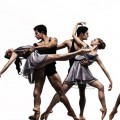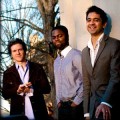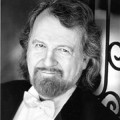Four of eight works heard during the second weekend of the Cabrillo Festival of Contemporary Music took a decidedly retrospective look back that—big surprise—seduced audiences long used to confronting the avant-garde’s cutting edge.
On Saturday, Kevin Putz’ piano concerto Night (2007) was, by his own admission, modeled on Maurice Ravel’s Concerto in G, sans the jazzy elements, and indulges flavors of Rachmaninoff. John Adams’ City Noir is, he said, “an imaginary film score … for virtuoso orchestra.”
At Sunday’s San Juan Bautista program, Uzbek-Australian composer Elena Kats-Chernin’s Heaven Is Closed (2000) unashamedly restored tonal harmonies to Cabrillo’s vocabulary, while Philip Glass’ Cello Concerto came dangerously close to traditional harmonic cadences itself. But for the Adams, whose final movement upped the orchestral congestion to a brilliant if challenging level, the rest was downright easy listening.
Putz yet again renewed the vitality and energy that have inspired director Marin Alsop to invite him back to Cabrillo again and again. In this instance, he put on display his own piano virtuosity well mastered before he turned to the composer’s life. A combination of ringing bell tones and repeating arpeggios laid a tonal foundation over which he played right-hand melodies in other keys generating tasty dissonances.
The three movements are Dies Irae (without that actual hoary old tune), Nocturne and Midnight Toccata. The Glass concerto (2001) also tracked the three traditional movements, with expected minimalist fingerprints and soaring melodies. In the long slow movement, Glass skillfully mined a rich thematic vein. Cellist Wendy Sutter made her 1620 Amati instrument sing and cavort.
At 33 minutes, the work lasted as long as the Adams symphony (2009). That work’s first two movements, The City and Its Double and The Song Is for You, were played without a break. Every kind of movie-musical device was paraphrased in the lush score, not least a variety of jazz-inflected solos (on sax, trumpet, trombone, viola, etc.), which gain complexity amid cinematic cameos of L.A.’s distinctive intersections in the finale, Boulevard Night.
On Sunday, George Theophilus Walker’s Foils (2006), an homage to the mythical St. George, fenced with angular thrusts in the musical rhetoric of the 1960s familiar among the 88-year-old composer’s earlier works. Framed in quiet sorrow, Pierre Jalbert’s In Aeternam (2000) spent most of its 14 minutes in violent grief over the death-at-birth of a niece. The Saturday program opened with short works by Michael Shapiro and Sean Hickey.

 Bernie Lubell’s Intimate Tech
Bernie Lubell’s Intimate Tech  The Business Candidate?
The Business Candidate? 


